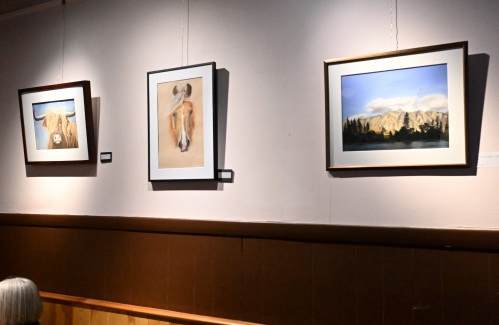
Mill Street Artists displaying work at Hope & Olive in Greenfield
GREENFIELD — Four former students of Artspace Community Arts Center are showcasing their work at Hope & Olive through April and May.
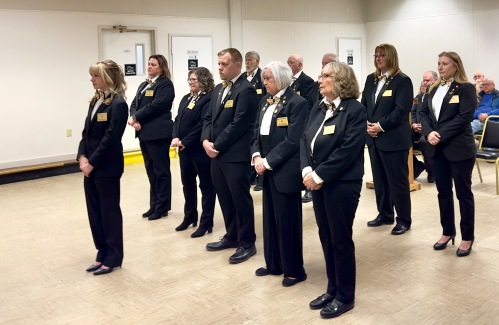
‘She is our future’: Thirty years after permitting women to join, Montague Elks is almost entirely women-led
It wasn’t until 1995 that women were permitted to join the Benevolent and Protective Order of Elks (BPOE), a century-old fraternal and charitable organization with local lodges across the United States. Thirty years later, the Montague Elks Lodge #2521 is entering a new era of leadership with women at the helm of the 50-year-old lodge.
Most Read
 Local ‘Hands Off!’ standouts planned as part of national effort
Local ‘Hands Off!’ standouts planned as part of national effort
 Shelburne Selectboard determines police detective will retain job
Shelburne Selectboard determines police detective will retain job
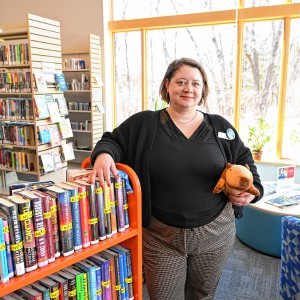 Local libraries react to state funding cuts, federal administrative leave
Local libraries react to state funding cuts, federal administrative leave
 Incandescent Brewing now open in Bernardston
Incandescent Brewing now open in Bernardston
 Cooking up an expansion: Cocina Lupita eyes second location in Turners Falls
Cooking up an expansion: Cocina Lupita eyes second location in Turners Falls
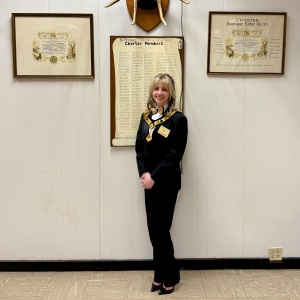 ‘She is our future’: Thirty years after permitting women to join, Montague Elks is almost entirely women-led
‘She is our future’: Thirty years after permitting women to join, Montague Elks is almost entirely women-led
Editors Picks
 PHOTO: Gobbling up attention
PHOTO: Gobbling up attention
 PHOTOS: GCC hosts Involvement Expo
PHOTOS: GCC hosts Involvement Expo
 Part 1: Enough Abuse shares series of tips for National Child Abuse Prevention Month
Part 1: Enough Abuse shares series of tips for National Child Abuse Prevention Month
 Montague and Erving Notebook: April 5, 2025
Montague and Erving Notebook: April 5, 2025
Sports

HS Softball: Turners’ Madi Liimatainen strikes out 17, Franklin Tech’s Kylee Gamache records 100th hit in Thunder’s 10-3 win (PHOTOS)
TURNERS FALLS — Turners Falls softball coach Gary Mullins knew his team would be facing tough pitchers throughout the year. Taking on one of them in Franklin Tech’s Hannah Gilbert Friday, the longtime coach was proud of the way his players handled the pressure at the plate.
 High school softball preview 2025: Can Turners Falls defend its Division 5 state title?
High school softball preview 2025: Can Turners Falls defend its Division 5 state title?
 Keeping Score with Chip Ainsworth: Florida is softball paradise
Keeping Score with Chip Ainsworth: Florida is softball paradise
 On The Run with John Stifler: Fast walkers
On The Run with John Stifler: Fast walkers
Opinion

Beth Girshman: Support federal funding of libraries and museums
I am stunned at the potential losses for library services throughout Massachusetts with the proposed elimination or reductions in federal IMLS funding.
 Dale Moss: Trump, Musk actions will cause long-term damage
Dale Moss: Trump, Musk actions will cause long-term damage
 My Turn: Energizing a school — and a community
My Turn: Energizing a school — and a community
 Guest columnist Liz Brown: Abortion care is health care
Guest columnist Liz Brown: Abortion care is health care
 Sam Michel: Promises made, promises kept
Sam Michel: Promises made, promises kept

Your Daily Puzzles

An approachable redesign to a classic. Explore our "hints."

A quick daily flip. Finally, someone cracked the code on digital jigsaw puzzles.

Chess but with chaos: Every day is a unique, wacky board.

Word search but as a strategy game. Clearing the board feels really good.

Align the letters in just the right way to spell a word. And then more words.
Business

Cooking up an expansion: Cocina Lupita eyes second location in Turners Falls
GREENFIELD — The owners of Salvadoran restaurant Cocina Lupita are seeking the community’s support to help fuel their goal of opening a second location in Turners Falls this May.
 Incandescent Brewing now open in Bernardston
Incandescent Brewing now open in Bernardston
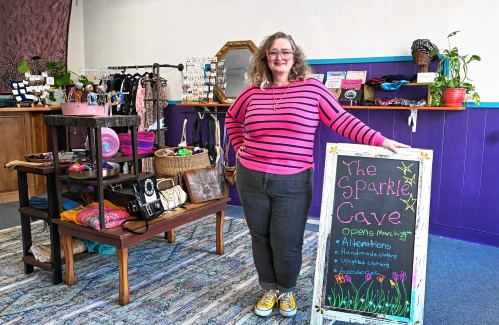 Out with fast fashion, in with sustainability: The Sparkle Cave clothing store opens in Greenfield
Out with fast fashion, in with sustainability: The Sparkle Cave clothing store opens in Greenfield
 Greenfield Starbucks pours its first cup
Greenfield Starbucks pours its first cup
Arts & Life

Amherst can’t decide where it is: Is town center uptown or downtown?
Those attending a recent ribbon-cutting for the new UMass Downtown retail store and event space in Amherst center were invited to an afterparty at the Uptown Tap & Grille, which despite having a seemingly different geographical designation, is a neighboring business in the same building.
Obituaries
 Douglas Spencer
Douglas Spencer
Easthampton, MA - Douglas A. Spencer, age 69, resident of Easthampton, formerly of Greenfield died February 5, 2025 at Baystate Medical Center, Springfield. Doug was a 1974 graduate of Pioneer Valley Regional School and the Bement S... remainder of obit for Douglas Spencer
 Rebecca Clogston
Rebecca Clogston
Greenfield, MA - Rebecca Susan Clogston, a woman of immense strength and kindness, passed away on Saturday, February 22, 2025, at 63 years old. She was born at Cooley Dickinson Hospital in Northampton, MA, to John and Mary Bartus. Rebec... remainder of obit for Rebecca Clogston
 Richard Wilson Kean Jr.
Richard Wilson Kean Jr.
Richard Wilson Kean, Jr. East Hawley, MA - Richard Wilson Kean, Jr. (Rick), passed away peacefully on March 30th, 2025, at the age of 80. His story began January 4, 1945 in Jackson Heights, NY when he was born to Richard Wilson Kean, Sr.... remainder of obit for Richard Wilson Kean Jr.
 Paul E. Huggard
Paul E. Huggard
Shelburne Falls, MA - Paul E. Huggard passed away peacefully at home with his loving wife Rosemary (Egan) of 36 years by his side after battling cancer. He was born the son of Gordon and Anne (Brewer) Huggard in Woburn, MA, and spen... remainder of obit for Paul E. Huggard

 Greenfield Historical Commission gives nod to apartment proposal for Main Street
Greenfield Historical Commission gives nod to apartment proposal for Main Street
 A flash point over gun control: Can Massachusetts’ strict firearms law survive the 2026 ballot?
A flash point over gun control: Can Massachusetts’ strict firearms law survive the 2026 ballot?
 FRCOG hosts discussion on advocacy efforts to support children, caregivers
FRCOG hosts discussion on advocacy efforts to support children, caregivers
 Shelburne Falls poet releasing ‘Jailbreak of Sparrows’
Shelburne Falls poet releasing ‘Jailbreak of Sparrows’
 As I See It: How liberty itself killed liberalism in America
As I See It: How liberty itself killed liberalism in America
 My Turn: Invest in hunger-free campuses to make free college truly work
My Turn: Invest in hunger-free campuses to make free college truly work
 Beacon Hill Roll Call: March 24 to March 28, 2025
Beacon Hill Roll Call: March 24 to March 28, 2025
 New panel to review senior housing proposals in Deerfield
New panel to review senior housing proposals in Deerfield
 HS Roundup: Greenfield’s MacKenzie Paulin throws no-hitter to lift Green Wave past Hopkins, 6-1
HS Roundup: Greenfield’s MacKenzie Paulin throws no-hitter to lift Green Wave past Hopkins, 6-1 Creating a ‘mecca of local art’: JJ White opening Art Deviation Gallery & Store in Greenfield
Creating a ‘mecca of local art’: JJ White opening Art Deviation Gallery & Store in Greenfield ‘Art in the Age of Human Impact’: New exhibition at UMass explores complex relationship between humans and nature
‘Art in the Age of Human Impact’: New exhibition at UMass explores complex relationship between humans and nature Valley Bounty: Nothing sweeter than sourcing local: Lemon Bakery in Amherst is a small, seasonal, from-scratch operation
Valley Bounty: Nothing sweeter than sourcing local: Lemon Bakery in Amherst is a small, seasonal, from-scratch operation Here to help the community’s artists: Human Scale Art Space aims to advance visual arts in the Pioneer Valley
Here to help the community’s artists: Human Scale Art Space aims to advance visual arts in the Pioneer Valley Sounds Local: A legend pays tribute to an icon: Seven-time Grammy-nominated Joan Osborne brings Bob Dylan repertoire to Shea Theater
Sounds Local: A legend pays tribute to an icon: Seven-time Grammy-nominated Joan Osborne brings Bob Dylan repertoire to Shea Theater
